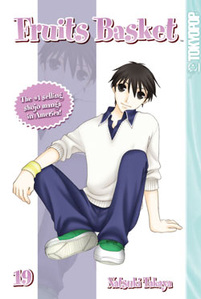Review
by Carl Kimlinger,Fruits Basket
GN 19
| Synopsis: |  |
||
.Kyo's fate in the Sohma family weighs heavily on Tohru, who is desperate to find a cure for the curse before Kyo graduates and is imprisoned at the Sohma compound. The two have grown painfully close and though their mutual obliviousness blinds each to the other's true feelings, it's obvious to everyone—including middle-school kids like Hiro—what they mean to each other. While Tohru's grandfather and Momiji nudge Kyo in Tohru's direction, even going so far as to reveal deep family scars, Tohru is in an agony of doubt, denial and self-recrimination after realizing she may care more about Kyo than her deceased mother, throwing the carefully maintained order of her emotional world into chaos. Yuki in the meantime gently, tentatively courts emotionally scarred fellow student council member Machi, Ayame reveals his assistant Mine's role in the awakening of his emotional conscience, and student council vice-president Kakeru confesses to Yuki his cruel connection to Tohru. |
|||
| Review: | |||
Those who found the last few volumes, with their lengthy explorations of secondary characters and fleeting, tantalizing glimpses of Kyo and Tohru's slowly evolving relationship, to be exquisite torture, will find this volume to be giddy, triple-hanky bliss. Fully half of this volume is devoted the pair sorting their complicated feelings and trying to decide where to take their relationship, and even those sections dedicated to other characters are spiked with adorable little Tohru/Kyo moments. Looking at the series now it's sometimes a bit difficult to imagine that it was once a light—if melancholy—comedy. The sadness that once lay just beneath the surface has now risen to the top and is boiling furiously there. Tohru's attempts to reconcile her current feelings and goals with the trauma that forged her personality, Kyo's conflicting despair and affection, and Tohru's desperate grappling with the depth and true darkness of the Sohma curse twist together to form a formidable web of dripping angst. Soaked in tears and mined with bottomless pits of emotional introspection, the manga still manages to preserve a sense of understatement thanks to Natsuki Takaya's visual misdirection and habit of anchoring even the most intense of emotions firmly in her quiet, introverted characters. So when Tohru flays herself, it's an internal, vicariously emotional experience, not just a character bitching. And when characters connect with one another—prepare yourself for an achingly sweet chaste embrace—it's all the more powerful for the rarity with which they truly express themselves. Volumes of withdrawal have sharpened the appetite for Tohru/Kyo romance such that it's hard not to treat the half-volume devoted to them like barbecue at a vegetarian picnic, but to do so would ignore the wealth of wholesome, peripherally-related goodness that this volume also has to offer. Takaya hasn't forgotten how to break the tension with silly humor, and enough goofy Kakeru and Ayame moments are scattered about to keep the dark internal monologues from growing overbearing. And Kyo's reactions to the romantic drama beginning to develop around him are priceless. Ayame grows just a little less incomprehensible once his relationship with Mine is clarified, Yuki and Machi's halting courtship is downright cuddly, and Kakeru gets some well-deserved development. However, it is perhaps telling that, even in the midst of Kakeru's big chapter, it's the sight of Tohru's gentle, sad smile that steals your heart. It may be that a character-development salad really can't compete with a slab of emotional meat slathered in angst-sauce. Perhaps the most important achievement of Natsuki Takaya's art—aside from its ability to insert audiences into characters' minds with almost impressionistic montages of fragmented memory and expressive shadow—is its evocation of inexorably passing time. In part it's unintentional—the inevitable result of her steadily improving skill with a pen—but it's largely intentional, suggested by frequent flashbacks that emphasize the changes characters have suffered over the years, and by unobtrusively evolving character designs. Nothing evokes the passage of time like watching Tohru coming more and more to resemble her mother, or Kyo and Yuki growing closer in appearance to the adults of the Sohma family. Though the prize for most altered character design goes to Momiji, whose transformation this volume is truly shocking. Takaya's art remains light on backgrounds and heavy on dialogue bubbles, but both are appropriate in their own way, and minor flaws aside, her art is dark and complex when needed, bright and fluffy when asked, and generally slick and distinctive. After nineteen volumes, hardly anyone needs to be told anything about the quality of Tokyopop's release, however it should be mentioned that the normal "Fans Basket" section is occupied this time by a fourteen page doujinshi of surprisingly decent quality. This volume really earns the the romance genre classification that Tokyopop assigned it; this is perhaps the series' most romantic volume to date. There are at least four separate romances here, ranging from the sweet to the... well sweet (but torturously uncertain), serving up ample evidence for the series' reign amongst those fans for whom the tightening of the heart or thrill of empathy in the gut is the ultimate measure of a shoujo manga's quality. |
|
The views and opinions expressed in this article are solely those of the author(s) and do not necessarily represent the views of Anime News Network, its employees, owners, or sponsors.
|
| Grade: | |||
Overall : B+
Story : A-
Art : B+
+ Piles on the big emotions and sweet romance without losing its essential reserve. |
|||
| discuss this in the forum (5 posts) | | |||
| Production Info: | ||
|
Full encyclopedia details about Release information about |
||